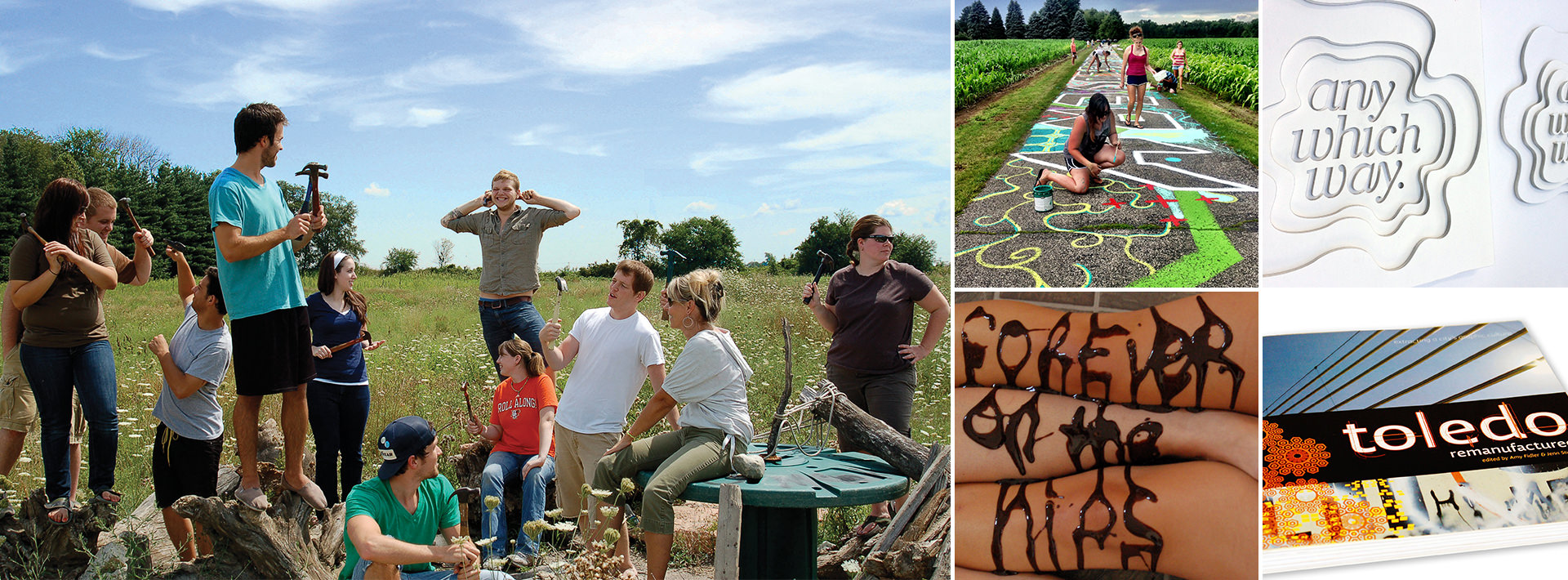Experimental Design
Graphic design faculty SWEAT during summer workshop

By Jen Sobolewski
Bullying, murals, fast food, hammers, the graphic expression of Toledo—it’s a group of seemingly unrelated items. But for the students who have participated in a summer workshop run by graphic design faculty members Jenn Stucker and Amy Fidler, they are the topics that have allowed them to delve deep into experimental design work.
It’s called SWEAT, or Summer Workshop for Experimentation and Thought. The idea came to Stucker and Fidler after attending a design educators conference in 2007. The pair knew they wanted to do something over the summer with their exceptional students, but didn’t want it to be a class, or terribly structured. The idea of a summer workshop was born.
“It was more about the experience of getting together and doing some fun experimental work that they could incorporate into school and that the students might be interested and engaged in,” explained Stucker.
Out of the first month-long workshop emerged the book “Toledo Remanufactured.”
“We gave students an envelope the first day and in it the assignment was ‘What is the graphic expression of Toledo?’ We then went on field trips into Toledo photographing. None of them were from Toledo and it was really fascinating—they were seeing things that I had taken for granted” Stucker said.
The book was a resounding success. They did an exhibition for Artomatic 419, an event in downtown Toledo, and even received an official proclamation from the city for their work in promoting city pride. A copy now resides in every library in Toledo.
From that point on, Stucker and Fidler were off and running. Each summer brings a new topic and a new medium for the students to work in.
“Sometimes it’s community-based stuff like ‘Use-Less Toledo’ to consider sustainability and design and asking participants to work in video,” Fidler explained. “Sometimes the content isn’t as serious. We’ve looked at the graphic expression of hammers and junk food. The content ebbs and flows with the seriousness. The work is always excellent, but the prompts can be solemn like this summer’s bullying.”
Fidler said the varying topics and mediums keeps things fresh for the participants as well as themselves.
“We’re really responsive to things that just might arise out of opportunities. Our most recent one, the bullying, we had a paper rep that was willing to donate whatever paper we wanted, so we decided to work on a letterpress and laser cutter,” said Stucker.
The result is a book called “2-Faced,” which represents both sides of bullying—the victim and the perpetrator. To illustrate that point, the book reads two different ways. On one side, the topic is “sometimes we can be so mean” and on the flip side it reads “sometimes we can be so nice.”
“The title was that we acknowledge that everyone is on both sides. We’re not all innocent in this process. We all engage in some way or another,” said Stucker.
Students created deeply personal works that reflected the serious topic. One student did a linoleum cut, duct taped it to his chest and laid on the ground. When he took it off, he photographed the impression left on his skin. Another student laser cut a letter to her bully and then did a “flip side” letter to someone she had bullied.
“It was a very loaded topic. Some of the students had had serious issues with it and others hadn’t,” said Fidler.
An exhibition in April will display the physical pieces featured in the book.
Stucker and Fidler call the workshop a highlight of their year and said it allows them to experiment with formats they don’t have time to explore during the academic year. It also creates a special bond between them and their students.
“They trust us and will work hard for us because they’ve seen us work hard for them. You can say in the classroom, I know what you’re capable of, I’ve seen it,” Stucker said.
Fidler added, “they’re better classmates to each other. They raise the level and bring other people up with them. It just helps in so many ways.”
The current workshop is one week long and participants pay a small fee to cover their costs. Stucker said the students have gone on to competitive, well known national workshops and received great job offers due to the experience.
“We don’t see our jobs as jobs. We don’t see the summer as a break. This is just part of who you are. It’s not painful to do this—it’s a joy. We learn just as much as they do,” Stucker said.
Updated: 12/02/2017 12:42AM
